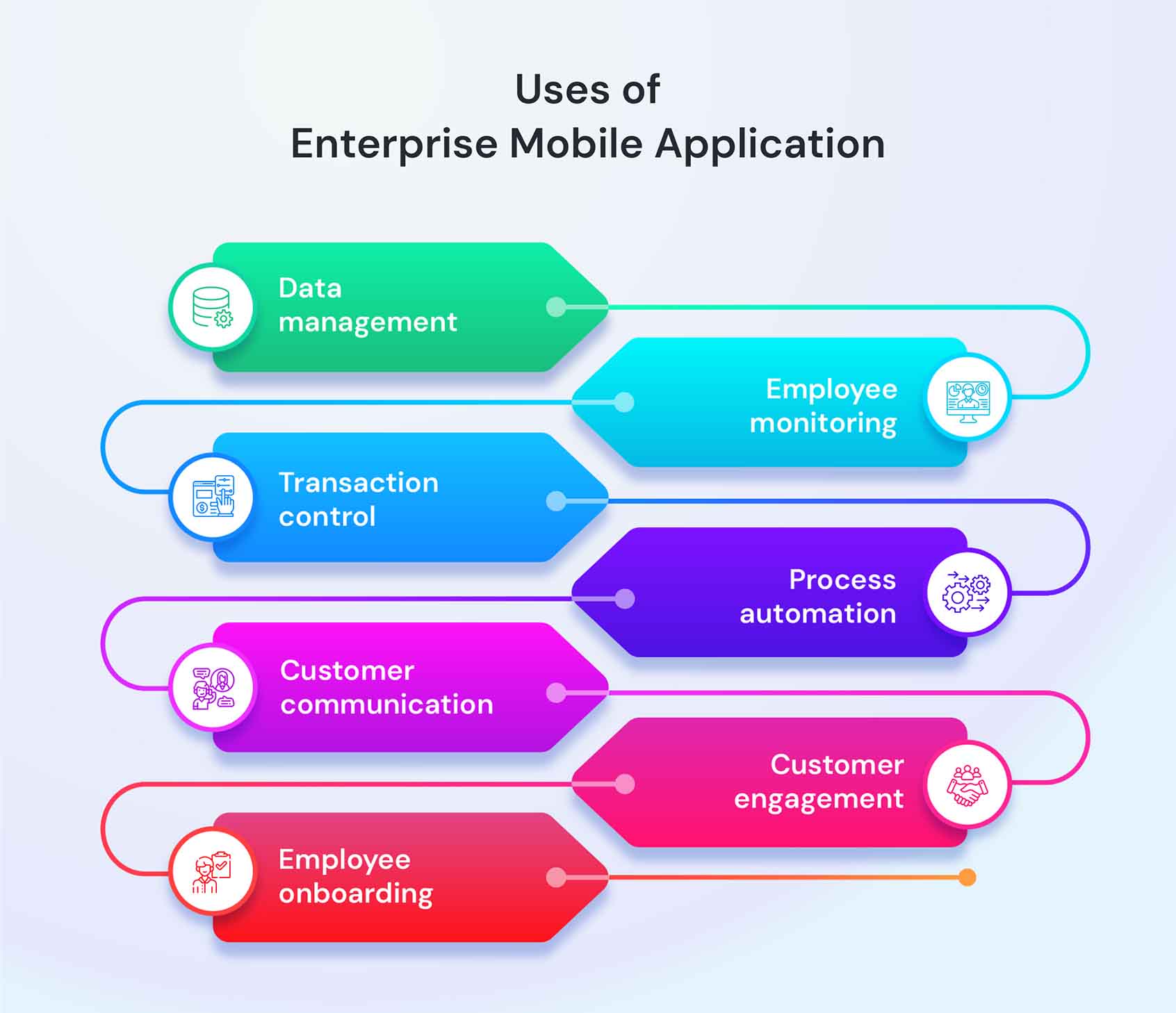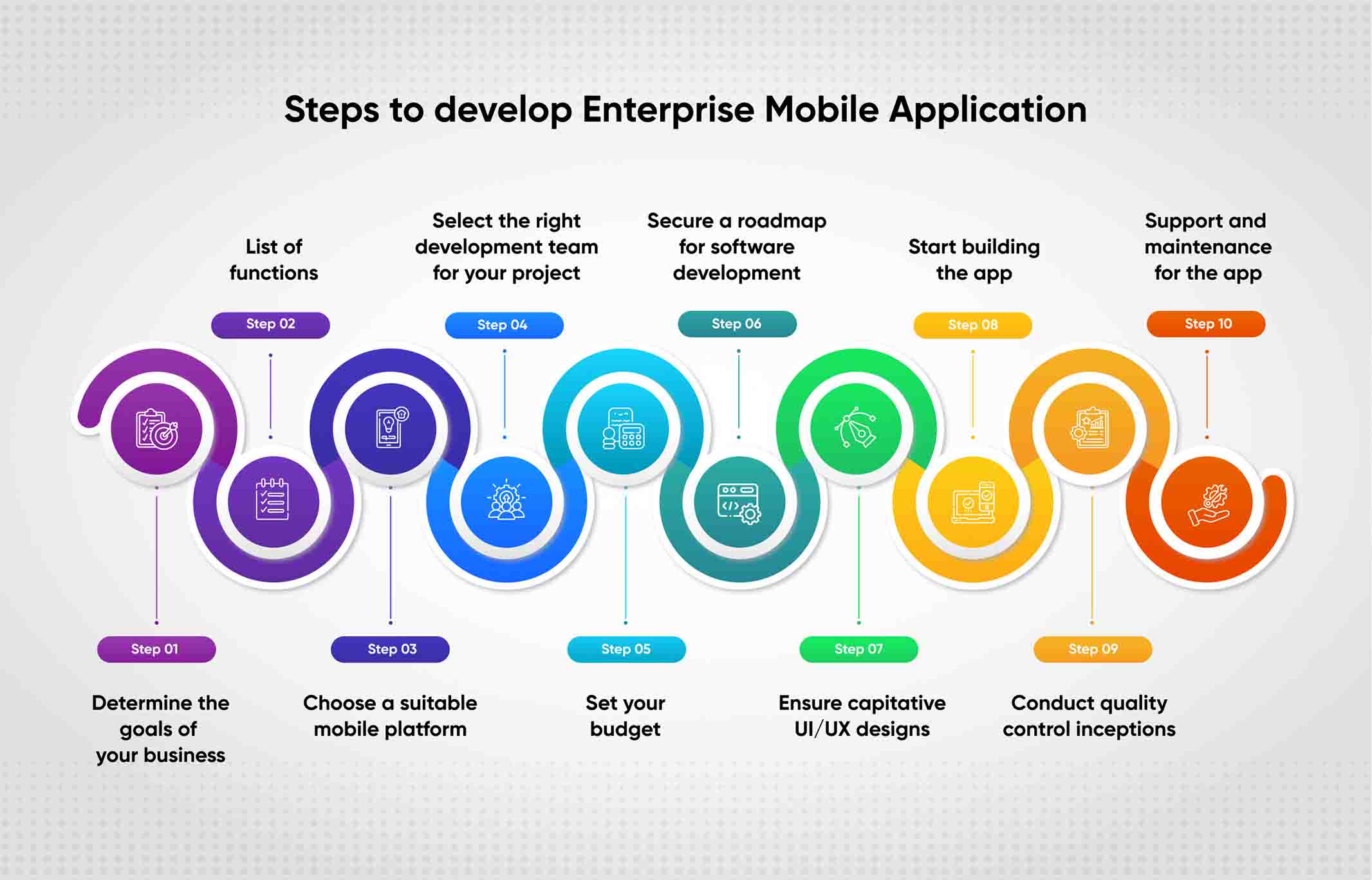Read on the write-up to know everything about enterprise mobile application development and how it is crucial for businesses.
Enterprise Mobile Application Development: A Guide that Covers All Aspects
Technology has changed it all for us, for businesses and for companies providing enterprise mobile application development services. What does that mean for business? Is it for good or the competition has soared extensively? Does that mean more and advanced use of technology or better growth opportunities? Let’s try and find out the answers here in this blog.
In today’s fast-paced market, businesses strive to maintain a competitive edge. They aim to boost corporate efficiency and wish to unlock new revenue opportunities simultaneously. However, keeping up with emerging trends can be challenging no matter which sector you operate in. there could be problems that will need specific solutions and assistance from a reliable enterprise mobile app development agency. To navigate these challenges, organizations need tailored solutions at various locations.
With numerous companies running in for the same benefits, companies must consider enterprise mobile application development solutions. This approach will offer numerous results including increased productivity while ensuring competitive advantages.
There is a soaring number of users who contribute to the downloads of mobile application every single day. This number is as massive as 6.3 million people with nearly 250 million apps downloaded each day. The interesting news is the number is rapidly growing.
As increasing number of people are contributing to the apps download on a regular basis, it is important for businesses to stay updated in this race. Not joining this competitive race may have negative impact for the business in the long run.
Keep on reading the article to discover the challenges, key considerations, and the availability of enterprise mobile app development services. and processes you’ll need. The article will provide considerable ideas that could take your business to new avenues with enterprise mobile application development strategy.
But before we move forward, let’s understand more closely the concept of enterprise mobile applications.
What are Enterprise Apps?
Applications development specifically for enterprise-sized firms customized to meet their needs is termed as “enterprise mobile applications.” enterprise apps play a critical role in facilitating streamlined communication within organizations among employees at all levels.
Unlike standard applications that are developed for users individually, enterprise apps are created solely for organizational needs. With such apps for business, it gets easier for partners, clients, and staff members to communicate easily with one another.
Enterprise apps can be best understood through apps like, salesforce CRM, HubSpot CRM, etc. thee apps are basically customer relationship management software developed for ensuring better communication.
Types of Enterprise Mobile Applications
Enterprise Mobile Applications are powerful software programs. They are specifically designed helping organizations cut costs. The development also aims to enhance customer service. Enterprise mobile apps enable employees be productive from different locations just with internet and data access on their smartphones. Enterprises apps are efficient to drive efficiency at organization while ensure flexibility at the same time.
Enterprise apps can specifically be developed for specific tasks and that is how, sometimes their type is specified. Here is more on the types of enterprise mobile applications.
Enterprise Resource Planning or ERP
As the name explains, enterprise resource planning or ERP software program is helpful for creating plans for employees. These programs help in creating and managing tasks for employees while keeping others in notice of ongoing tasks. Enterprise resource planning systems are exceptional when it comes to managing essential parts of businesses.
Right from implementing plans to keeping resources managed in a better way, ERP does it all for organizations. These systems do help in managing purchasing, inventory, sales, finance, and human resource. The amazing capabilities of these businesses to manage the various aspects of organizations is added benefit.
Automated billing
Automated billing is an excellent option when it comes to managing multiple invoices and billing. The element of automation allows companies to manage things easily and in an efficient way. Added to that, tracking of the transaction becomes easier for companies managing a number of customers simultaneously.
With little to no manual input, automated billing is helpful to generate invoices, collecting payments, and keep things organized for better customer servicing. The best thing about these programs is they can easily manage even a huge number of billing and related tasks.
Customer Relationship management
Customer Relationship Management (CRM) systems empower businesses to efficiently manage customer service records. They are exceptional for producing insightful reports. CRA or customer relationship management systems facilitate streamline operations by swiftly modififying the existing plans or systems.
They are instrumental tools that help analyse and enhance interactions with both current and prospective customers. With the growing emphasis on customer experience, CRMs are projected to generate over $47 billion in revenue, if reports are to be believed. This highlights the critical role of enterprise mobile apps in modern business strategies.
Marketing Automation
Marketing automation is yet another beneficial feature of enterprise mobile application development solution. This enables marketers to effortlessly schedule and automate their communications. These tools not only streamline marketing efforts but also provide valuable insights into the activities of employees and partners.
With such a tracking facility provided by this software, businesses have the ease to effortlessly offer customer service while improving its impact. In addition to this, the software system is just great to allow a more responsive and efficient approach to meeting customer needs.
HR Management
HR management software are programmed with robust features to track employee performance. The tracking and feedback deliver option makes such systems the best of all for utilising it for resource management purposes. The system is thus also promising for streamlining the process of managing both daily tasks and strategic goals for HR teams.
By automating repetitive tasks and ensuring team collaboration, these solutions significantly enhance departmental efficiency and performance. The benefits of implementing such software are substantial for any business. They not only ensure better servicing of processes but also ensure better management of business.
Email Marketing System
The option of email marketing with enterprise mobile app development platform enables companies to send targeted emails and messages to customers. These messages are development keeping client’s specific demands in mind and therefore tailored to their specific location and timing.
The best of benefits with such an email marketing system is it can be optimized as per location-based data and optimal timing. This further helps businesses to enhance their communication strategies. A well-planned customer-optimized strategy thus ensure that messages are relevant and are sent on time to each customer.
A collaborative System
Such a solution ensures tools and techniques designed for boosting productivity. Additional features include employees tracking options and facilitating seamless communication. This also allows for efficient file sharing from one team mate to another.
As all of these activities for an essential part of everyday business management, such a system proved to be efficient for business. The added benefits include workflow management, team collaboration, and effectively staying organized.
Integrated Mobile Workforce
Integrated mobile workforce system integrates cutting-edge mobile devices and sophisticated applications with advanced software. The exceptional software features facilitate empowerment of employees to access essential information anytime, anywhere.
By providing this seamless connectivity, it ensures that employees can perform their tasks efficiently. The efficient doesn’t get harm depending upon the location. It thus ensures enhanced overall productivity and flexibility within the organization.
Enterprise Mobile Application: Why Your Business Need One?
After going through all the types and benefits that mobile enterprise applications offer, you must have known its critical importance in organizations. Considering the importance of enterprise apps let’s examine in detail the benefits that such a system provides to businesses and how they can make the most out of the same.
To control Transactions
A dedicated mobile app is essential for businesses needing an e-commerce payment system. This mobile enterprise solution enables tracking, managing, and recording transactions. Developed to gather transaction data, the system simultaneously offers valuable insights.
It also helps to send notifications for payment deadlines. Aligning with your business goals, the app can also support various payment methods. All these transactions thus can be managed conveniently from your dashboard.
Employee Monitoring
In case you are using an enterprise app, some benefits like unifying the team comes along. The list of benefits also includes easy collaboration and access to the platform anywhere anytime.
Not only that the software’s feature also includes monitoring staff progress. With added advantages like receiving real-time updates and feedback, sharing information, and transferring files seamlessly, companies can easily commit to better communication and coordination among employees. It thus enhances overall productivity and teamwork.
Customer Communication
Mobile enterprise apps can effortlessly promise enhanced customer communication. The system helps you send push notification to customers for informing them about new services.
Additionally, the beneficial feature also comes into consideration when any particular service is about to be provided. Keeping customers in the known with new feature roll-out helps them gain a sense of being cared for by businesses.
Employee onboarding
Onboarding new hires is always a challenge for any company. Unlike traditional processes that involve a lot of manual form-filling and checks, automated onboarding is easier and effortless.
Additionally, manual filling can consume valuable time and resources. An enterprise mobile solution streamlines this process. The process is backed by seamlessly managing and tracking all related data, ensuring a smooth and efficient onboarding experience.
Process Automation
When alignment across business processes is crucial, investing in mobile apps to automate and enhance them becomes the way for businesses. This is possible enterprise mobile app solutions.
These apps are purpose-built to streamline management tasks. This additionally help in optimize workflows. All of this enhances operational efficiency and ensure smoother business operations.
Data Management
The app not only manages your business data effectively but also enhances information security and streamlines workflows. Streamlined workflows have greater business benefits.
In addition to this, employing advanced techniques such as encryption and tokenization, businesses can easily ensure robust data protection. This also safeguards sensitive information against unauthorized access or breaches.
Customer Engagement
Building strong business relationships with customers is an important business consideration. Therefore, businesses looking for the same can consider mobile enterprise app.
This accessibility enhances customer engagement, ensuring they have valuable resources at their fingertips while reinforcing your brand’s presence and commitment to customer satisfaction.
Enterprise Mobile Application Development Process: Defined
Planning an enterprise page requires the right strategy, ensuring the right approach and gaining services from the right enterprise mobile app development company. However, the right knowledge about the development process can help with gaining insightful information. Let’s have a look on how to create the app successfully going through various steps.
Step 1: Finding out Business Goals
Maintaining focus on your project’s core objectives is pivotal. This will ensure company’s success further resulting in improved app revenue. This phase needs taking the time to meticulously outline your goals, creating the right roadmap, and ensuring the process is being followed as designed. This strategic approach will help identify essential features for your software, ensuring it aligns closely with your business objectives.
Step 2: Making the functionality List
This phase is all about creating a comprehensive list of essential software features. The features are tailored to meet the specific goals and objectives of your organization. This ensures that your software aligns perfectly with your strategic priorities. All of this simultaneously results in enhancing efficiency and effectiveness across all operational areas.
Step 3: Choosing Mobile Enterprise Platform
In this crucial step, it’s essential to reassess your company’s objectives thoroughly. Consider your target audience and their preferred mobile platform. Learn whether they lean towards iPhones or Android devices. You can opt for cross-platform development or prioritize one platform based on user preferences and market reach. Once you’ve decided on the platform, focus on selecting the optimal enterprise mobile app architecture. This ensures a scalable and secure solution.
Step 4: Choosing Development Team
Choosing the right development team can be the deciding factor for the success of your enterprise mobile application. Ensure you choose a company that is experienced, versatile and eager to learn about your company and services (required) before initiating partnership. Choose a team that remains committed to the goal needed to the business.
Step 5: setting the Budget
At this stage, you should have a solid understanding of your app’s objectives and the list of functionalities. Now is the time to engage with developers to discuss the project’s scope and the associated costs of app development. Request estimates from potential development partners and be prepared to adjust your budget accordingly. This proactive approach sets the foundation for a successful collaboration.
Step 6: Securing Software Development Roadmap
Collaborating with a dedicated team offers numerous advantages. These advantages include gaining insight into its daily operations while remaining assured about the security. Equipping yourself with a software development roadmap is essential for effectively guiding the team. This roadmap will help transform your vision into a detailed blueprint that outlines the project’s strategic objectives. Project managers and engineers subsequently translate this strategy into actionable tasks, ensuring alignment with the project’s overall goals.
Step 7: Selecting Engaging Designs
Enterprise apps must prioritize user engagement to be effective. Paying careful attention to UI/UX design is crucial. A user-friendly design ensures people browsing through the app will remain engaged. Work closely with your dedicated team to develop comprehensive workflow diagrams that encompass all potential user interactions. This collaborative effort ensures that the app not only meets but exceeds user expectations, enhancing usability and engagement across the enterprise.
Step 8: Starting the Development
The development process can be segmented into three essential parts:
- Front end/client side: This involves creating the user interface and experience that users interact with directly.
- Back-end/server technology: This aspect handles the server-side logic, database management, and overall application functionality.
- Application Programming Interface (API): APIs serve as the intermediary between the frontend and backend systems, enabling seamless communication and data exchange.
While backend development ensures the core functionality and data management of your app, frontend development focuses on creating an intuitive and engaging user interface. APIs facilitate the integration and interaction between these components, ensuring a cohesive and efficient application architecture.
Step 9: Testing the App
Ensuring the stability and security of your software relies heavily on comprehensive QA testing. It’s crucial to involve the QA team from the planning and design phases onward. This early involvement allows the QA team to fully grasp the app’s goals and functional requirements. By integrating QA into the development workflow early on, potential issues can be identified and addressed proactively. This ensures a robust and secure final product.
Step 10: Ensuring Support and Maintenance
After launching your enterprise application, it’s crucial to actively monitor its usage and key performance indicators. Keep a close eye on reports of crashes and user feedback to quickly address any issues that may hamper app reputation. Encourage feedback and suggestions for improvement from users and stakeholders alike, Valuable client input can guide future updates and enhancements in a seamless way.
How IDS Logic Can Help with App Development Services?
IDS Logic has an efficient team of mobile app developers who can offer top-notch result-oriented app development services. We are a team of experienced professionals having extensive years of development knowledge that offers clients the required edge.
For any app development requirements, you can easily reach out to us!
We are just a call away!













